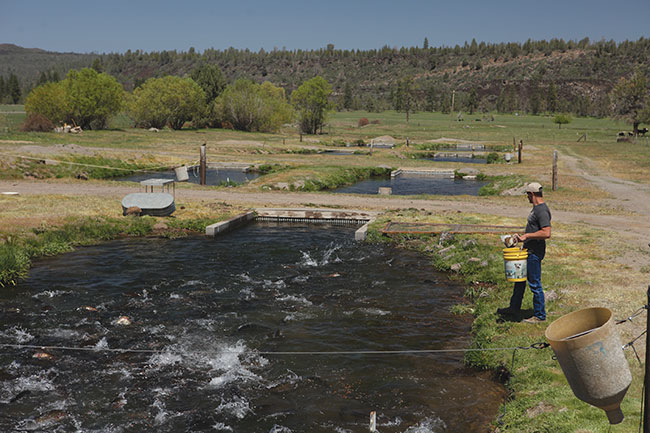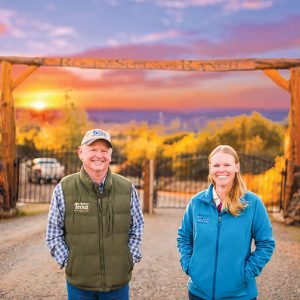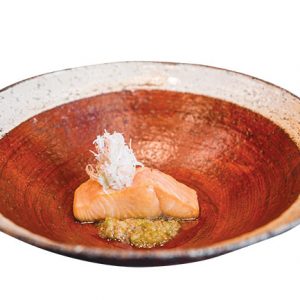
Leadership through crisis – It’s time to take charge
November 4, 2020
By
Liza Mayer
Relying on other people to sell your products in a pandemic isn't going to cut it, says steelhead farmer
 The farm’s steelhead trout are raised in spring water from the base of Mt Lassen in northern California
The farm’s steelhead trout are raised in spring water from the base of Mt Lassen in northern California The aquaculture industry has valiantly sprung to action to help stave off a food crisis while keeping staff safe during this pandemic. Through grit, will power and commitment, some are emerging from these difficult times stronger and with acute new sense of gratitude for their staff’s contribution. We look at the stories of three fish farmers; the fundamental shifts in their directions and lessons learned in the face of adversity. Liza Mayer reports
Katie Mackey Harris is a second-generation trout farmer who grew up at the family’s fish farm in Paynes Creek, California. Taking over the stewardship of Mt Lassen Trout & Steelhead from her father Phil Mackey, Harris knew she had big shoes to fill. Her father’s legacy of a fundamentally strong business has helped her steer the company through the turbulence, she says.
“I never in million years thought that our sales in the both the recreational and seafood markets would come to a screeching halt,” said Harris, Mt Lassen Trout president and general manager.
“The reason we got through this is we were financially solvent, thanks to my father building a strong company. We have some reserves. We got lines of credit if we need them. We availed of the paycheck protection program; it was a huge help to get us through, for sure. But we’re a strong company and the pandemic made us stronger.”
Founded in 1949, seafood accounts for a quarter of the farm’s business. The recreational market accounts for the majority. To say that having a diversified market helped blunt the pandemic’s impact is an understatement. The two segments went to opposite directions when the crisis struck.
Over the summer as indoor activities stayed shut, people took up fishing as a way to get outdoors and still maintain social distancing. That buoyed the farm’s recreational-market business.
“The majority of our sales are still in the rec fishing markets. It’s as strong as it has ever been if not more so with this pandemic. People who haven’t fished in years are going out and catching fish,” said Harris.
But its seafood sales went south as government-mandated lockdowns took effect. Mt Lassen Steelhead, raised in spring water from the base of Mt Lassen in northern California, go to white tablecloth restaurants around the state via distributors.
“We are still significantly down but we did see a slight increase over the summer,” Harris said. Time will tell if the recovery will carry through the winter, or through to 2021.
“I don’t see a really strong recovery in the restaurant trade next year. But I do believe it will come back, albeit slowly and painfully. It will be interesting to see where prices would go. But if we’re willing to change how we sell, whether it is direct to consumer or whatever, then there will be room for us.”
If there’s one weakness that the pandemic highlighted, it’s “that we don’t control our product as well as we should,” Harris acknowledged.
She is changing that by adding fish processing to the farm’s operations.
“Right now we don’t take a knife to our fish at all. The fish leave the farm live. We’ve had plans to process our fish ourselves before the pandemic hit. We now realize that relying on other people to sell your products in a pandemic, when restaurants shut down, isn’t going to cut it. We need to change. The way people buy food has changed with the pandemic so we need to change how we sell as well. A processing plant will allow us to do that.”
While there’s no set date as to when the processing operation will begin, she’s already invested in a stunning system. “We’re at the mercy of some elements but my goal is to start cutting fish by the first of the New Year, if not sooner.”
Harris concluded by acknowledging her team, many of whom have been with the company ever since she was a little girl running around the farm, she said.
“I am so grateful that I am surrounded by an incredible group of people that I work with everyday. Their resilience and determination to make things work: ‘no we can’t buy this new equipment but we’re going to figure out how to do it anyway.’ I feel so lucky to work with them.”
Advertisement
- Tool tests quality of live salmon
- Oyster farmers struggling as COVID-19 continues to impact restaurant industry








